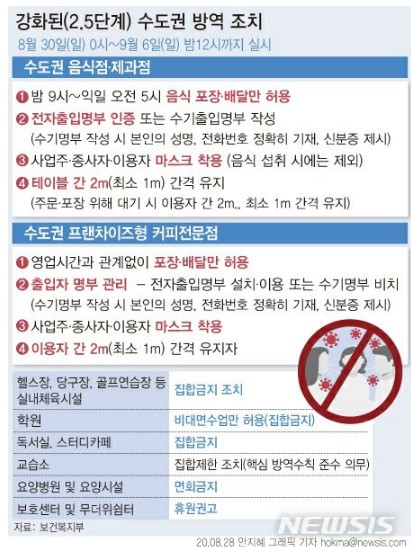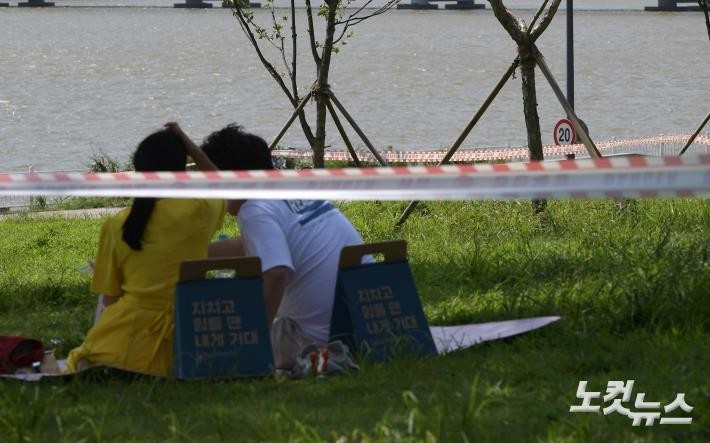The country’s number of new virus cases have been in the triple digits for over a month. On August 14, hundreds of new cases were reported, with the resurgence mostly traced to a conservative church in northern Seoul and an anti-government rally held in the middle of the capital. While the government has put in place a three-tier system, they have been cautious about raising the alarm to the highest level due to potential impact on the economy and people’s livelihoods. However, since the infection rate has started to soar rapidly, the government decided to introduce a new social distancing level, known as 2.5. The new tier introduces stricter rules for the Greater Seoul area.
A Level three social distancing plan includes; 1. Gathering with 10 or more participants are banned. 2. All sporting events including major professional events such as the Korean Professional Baseball league are suspended. 3. Some higher-risk places such as gyms, studying rooms, PC cafes are banned too. 4. Essentially all outdoor activities except those essential for social and economic purposes are banned. In order to alleviate the economic fallout from such severe measures the government instead chose to introduce a so-called Level 2.5 social distancing plan as a compromise. Under the new Level 2.5 distancing guidelines, restaurants and smaller eateries can operate as usual until 9 pm, however after they are only permitted takeaway and delivery orders until to 5 am. Franchise coffee chains were restricted to takeout and delivery regardless of their operating hours. Indoor gatherings with 50 or more participants and outdoor gathering with 100 or more participants were banned. The country also suspended the operation of indoor sports facilities, including fitness centers and billiard halls, as well as cram schools with more than 10 people.
 |
| ▲ The picture of new Level 2.5 distancing guidelines. (Photo from Yonhap) |
The new level initially applied its restrictions to franchise coffee shops, but came under fire for its discriminatory policy as it neglected bakeries, desert shops and ice cream parlors, so on August 4, the country added them to the list of those subject to the stricter operation restrictions. Nevertheless, non-franchise coffee shops remained unrestricted. People gathered in those places making social distancing difficult. In addition, with restrictions on indoor gatherings in place, people started meeting in outdoor spaces such as Han River parks. Some were even spotted not wearing masks as they strolled around the area. It was later made public that one person confirmed to have the virus, had visited the Han River park without wearing a mask on September 1. Unlike other locations, there is no method for recording those who visited the area to reach out to them to seek testing or self-quarantine. As a result, the Seoul metropolitan government restricted access to crowded picnic areas along the Han River parks to help prevent the spread of COVID-19. It is clear these rules will not work without the full cooperation of citizens. It is the only way to stop the spread of this potentially deadly disease.
 |
| ▲ Seoul city restricts access to Han River parks (Photo from Nocutnews) |
As more people are staying at home and trying to support local restaurants that have closed their doors to dine in services, Covid-19 lockdowns and quarantines have led to spikes in food delivery services. This has seen most third-party food delivery companies imposing additional ‘Covid charge’ to customers in order to guarantee greater profit. With news of the levies coming to light, customers boycotted restaurants charging the new fees making them suffer from heavy losses and some are even in danger of shutting down. In order to address the shock to the economy, South Korea’s fiscal chief asked the National Assembly to approve the recently submitted fourth supplementary budget bill, aimed at handing out emergency relief funds ahead of the Chuseok holiday.
New COVID-19 cases exceeded 300 for 4 days, and maintained triple digits for more than two weeks, with sporadic cluster infections in the Greater Seoul area continuing to raise alert. If the government is forced to upgrade to Level 3, it could bring daily life to a shutdown and deal a heavy blow to the economy. To revive our economy and be free from strict social distancing measures, it is important that everyone get on board and support the nation’s efforts.
박유정, 박소현 dankookherald@gmail.com

![[Campus Magnifier] Let's Surf the Library!](/news/photo/202404/12496_1765_4143.jpg) [Campus Magnifier] Let's Surf the Library!
[Campus Magnifier] Let's Surf the Library!
![[Campus Magnifier] Let's Surf the Library!](/news/thumbnail/202404/12496_1765_4143_v150.jpg)





